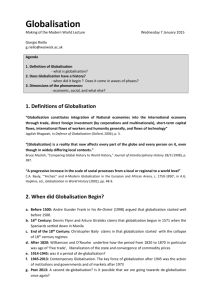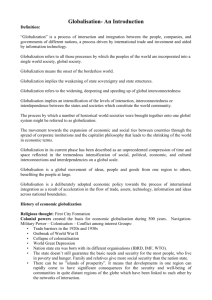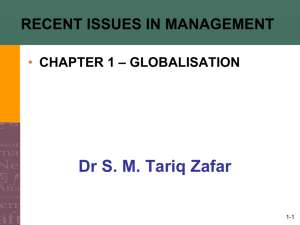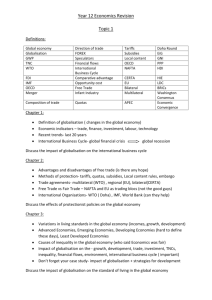globalisation essay
advertisement
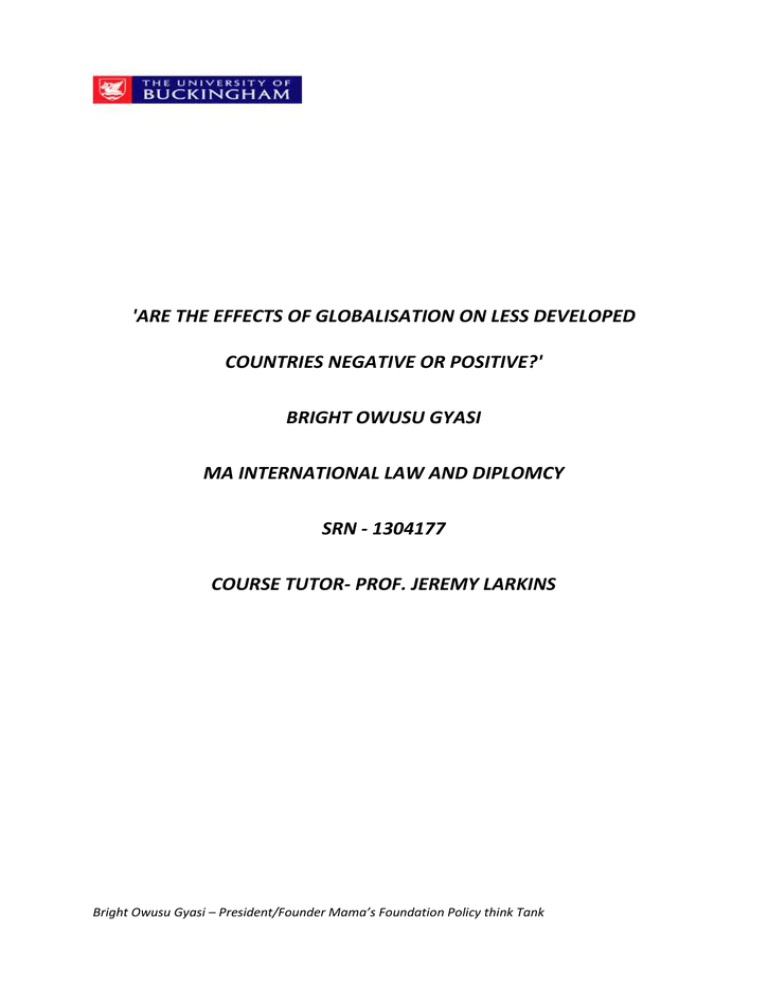
'ARE THE EFFECTS OF GLOBALISATION ON LESS DEVELOPED COUNTRIES NEGATIVE OR POSITIVE?' BRIGHT OWUSU GYASI MA INTERNATIONAL LAW AND DIPLOMCY SRN - 1304177 COURSE TUTOR- PROF. JEREMY LARKINS Bright Owusu Gyasi – President/Founder Mama’s Foundation Policy think Tank Globalisation is the contemporary cognate that has come to influence the world, since the end of the cold war, caused the partition of state, with an enhanced dependency on the global market economy and the revived trust in the private capital and resources.1 The method of structural adjustment propelled by the infusion of the International Monetary Fund (I.M.F), World Bank, the World Trade Organisation (W.T.O) and the other relevant international organisations have begun in many developing countries. 2 The epoch of globalisation has brought about new platforms for many economies leading to an expansion of market, transfer of technology leading to higher productivity and better living standards. Nevertheless, the concept has also introduced many worrying challenges, such as environmental deteriorations, dryness in financial market and growing inequalities.3 Globalisation is a source of both hope and of apprehension.one reading of economic change over the past hundred year's points to strong benefits from closer integration openness to trade, factors 1 Chandrasekaran Balakrishnan, Impact of Globalisation on Developing Countries and India [online]. (2014). Available from: <http://economics.about.com/od/globalizationtrade/l/aaglobalization.htm>. [Accessed 15.04.2014]. 2 Ibid 3 Ibid Bright Owusu Gyasi – President/Founder Mama’s Foundation Policy think Tank flow, ideas and information have powerfully stimulated progress, Economic and political.4 The most open nations are at the forefront of the advance.5 And when the leading industrial economies turned inwards after the First World War, the retreat from globalisation was a grave setback for the entire community of nations.6 This paper seeks to address the question: 'Are the effects of globalisation on less developed countries negative or positive?' In my answer I will employ strategic approaches in demonstrating both the negative and positive effects of globalisation in developing countries. In the light of this, this essay has been divided into three main sections. The first part provides an introduction to the background and outlines the key concept, the following section addresses the question more fully, which informs my final conclusion. At the beginning of the 1980s, global economies had become increasingly 'Bound' and 'Incorporated', because there had been decreased in transportation cost and the introduction of communication technology have drastically reduced the level of importance of the concept of 'Distance'. 7 Whereas, foreign direct investment, capital flows, and 4 Shahid Yusuf, Globalization and the Challenge for Developing Countries [online]. (2001, World Bank, DECRG). Available from: <http://elibrary.worldbank.org/doi/book/10.1596/1813-9450-2618>. [Accessed 21.04.2014]. 5 Ibid 6 Ibid 7 . Eddy Lee and Marco Vivarelli, The Social Impact of Globalization [online]. (2006). Available from: <http://ftp.iza.org/dp1925.pdf>. [Accessed 17.04.2014]. Bright Owusu Gyasi – President/Founder Mama’s Foundation Policy think Tank technological transfers have improved.8 In most countries the concept of globalisation has been accompanied by an increasing depreciating of domestic markets, particularly in developing countries.9 'Globalisation' in recent times has caused public debate, the concept continues to lack a clearly cut definition. This concept can mostly be explained as: 'The increased in trade and liberation policies as well as reduction in transportation cost and technology transfer'.10 The discussion of the concept has been dominated by economic growth, income distribution, employment, inequalities and other social factors, such as, labour rights, poverty alleviation environmental consequences.11 The United Nations (UN) explains globalization as: 'The reduction and removal of barriers between national borders in order to facilitate the flow of goods, capital and service'. 12 One limitation I found with this explanation is that it does not explain globalisation in the other sectors of human life. The above explanations only seeks to explain globalisation on the positive and economic aspect of the concept and fails to define the concept in totality.13 Held D, and McGrew concurs with the UN explanation, they define the concept as: 8 Ibid 9 Ibid 10 Ibid 11 Ibid 12 United Nations, Cited in Globalization and Its Impacts on Developing Countries [online]. (2014). Available from: <http://wiki.dickinson.edu/index.php 13 Ibid Bright Owusu Gyasi – President/Founder Mama’s Foundation Policy think Tank Constructing new forms of socio organisation that are supplanting, or will eventually supplant the traditional states as the principal economic and political units of world society.14 The component of the concept includes industrialisation, gross domestic growth (GDP) as well as the Human Development Index (HDI), whereas, 'GDP' is the market value of total goods produced in a state over a year.15 'Industrialisation' is the act, fuelled by technological advancement, social change and the transformation of a state into a developed industrial state.16 However, the human development index is made up of a state's population, knowledge, life expectancy, income and education.17 'Economic Development' Bhagwati J, argues that, the concept of globalisation is considered economically benevolent and an essential actor for the promotion of economic prosperity and providing a new wave of optimism for developing countries.18 The concept according to him has 14 Held, D. [online]. (2002). Available from: <https://www.unimuenster.de/Politikwissenschaft/Doppeldiplom/docs/Glob.pdf>. [Accessed 2`1.04.2014]. 15 Nicolas Pologeorgis, How Globalization Affects Developed Countries [online]. (2012). Available from: <http://www.investopedia.com/articles/economics/10/globalization-developed-countries.asp>. [Accessed 21.04.2014 16 Ibid 17 Ibid 18 Jagdish Bhagwati, Cited in, J. Ricardo Tranjan, 3.Globalization and Social and Economic Development: A Comparative Book Review of Making Globalization Work, The Bottom Billion, and In Defence of Globalization [online]. (2007). Available from: <http://www.getempo.org/index.php/revistas/23-01/artigo/34-globalizationand-social-and-economic-development-a-comparative-book-review-of-making-globalization-work-the-bottombillion-and-in-defense-of-globalization-by-j-ricardo-tranjan>. [Accessed 25.04.2014]. Bright Owusu Gyasi – President/Founder Mama’s Foundation Policy think Tank initiated the reduction of trade barriers to ensure and promote the free flow of services, goods, and labour from one state to the other.19 One question that needs to be asked from this explanation by Bhagwati is: 'Has the removal of barries on trade and the free flow of services been beneficial to less developing countries?'.The explanation only sought to outline the positive impact of globalisation on developing countries. Nevertheless, Chatterji and Gangod concurs with Baghwati on his acount, and further asserts that globalisation provides the framework of opportunities for developing countries, to stabilise thier economies by harvesting the gains from trade liberation. I do agree with Charterji and Gangod in the sense that, the concept of globalisation has essentially taken off the hindrances on trade through the removal of tariffs and import duties. However, this in my view has not been favourable to developing countries. The situation kills local industry and allows for the domination of developing countries economies with the manufacture of cheap products from the developed economies.20 Bhagwati further advances his argument by asserting that,the concept has brought about an enhanced capital flow into developing economies, he believes that the 'Foreign Direct Investment'(FDI) instils a high amount of capital into developing economies which brings about economic stability.21 Aurifeille J, concurs with the view expressed by Bhagwati and also asserts that, capital inflows by globalisation helps developing countries for the purposes of promoting economic developement in a 'State'. He asserts also that, developing countries have also gotten the 19 Ibid Ibid 21 Ibid 20 Bright Owusu Gyasi – President/Founder Mama’s Foundation Policy think Tank opportunity to recieve loans and grants from developed economies. 22 However, one weakness I find with this account is that, 'Capital Inflows' from developed countries has serious negative consequencies on domestic economies of developing countries. It does raise thier inflation rates but further weakens local currency, which makes developing Countries economies worst off. In addition, the idea by Bhagwati that developing countries as a results of globalisation have been exposed to the benefit of borrowing from the developed economies in my estimation does not really help developing countries in that sense that it rather creates the window of negative opprotunity for developing countries to increase their foreign debts which reduces a 'State' foreign reserves. Scholars like Bhagwati and Aurifeille also fails to acknowledge that capital inflow into developing countries have negative implication on domestic trade, by causing domestic currency depreciation against the major currencies from developed economies.23 Scaritt and Chan, however, disagrees with Bhagwati and Aurifeille and also asserts that, globalisation can factually fraustrate the resilence of developing countries economies through the injection of capital inflows from developed economies. This Scaritt and Chan believes could be as a results of the appreciation of exchange rates and high level of inflation which puts pressure on developing economies.24 Stolper S, however, disagrees with the assertion held by Bhagwati and Aurifeille and argues that, trade and Foreign Direct Investment(FDI) usually take the merit of the vailability of low 22 Aurifeille Cited in, J. Ricardo Tranjan, 3.Globalization and Social and Economic Development: A Comparative Book Review of Making Globalization Work, The Bottom Billion, and In Defence of Globalization [online]. (2007 23 Ibid 24 Scaritt and Chan Cited in, J. Ricardo Tranjan, 3.Globalization and Social and Economic Development: A Comparative Book Review of Making Globalization Work, The Bottom Billion, and In Defense of Globalization [online]. (2007 Bright Owusu Gyasi – President/Founder Mama’s Foundation Policy think Tank skilled labour in developing countries by exploiting them.25 This he believes brings about an increasing demand for domestic low skilled labour who are usually exploited leading to to general depreciating in their national wage bill and income inequalities. 26 I do concur with this asertion in that sense that this situation makes developing countries more vulnerable to exploitation and rather increases productivity in the developed economies. In recent times, most multinational firms make good use of modern technologies which has even reduce the aggregate of domestic employers in the developing countries and the very little that they employ are usually exploited.27 'Migration', Joseph S, in his book entitled 'Globalization and its Discontents' ,expostulates that globalisation has the potential of doing a lot of good to developing countries if managed properly taking into account the interest of individual countries.28 He further asserts that, countries should embrace globalisation on their own terms, taking into account their culture and traditions.29 One weakness I found with Joseph S, Account on the theory is that, developing countries are usually relegated to the background as they do not have much say and possess very little influence on theory, for example, the World Trade 25 Stolper-Samuelson, cited in, the social impact of globalisation in [online]. (2006). Available from: <http://wrap.warwick.ac.uk/1906/1/WRAP_Vivarelli_wp19906.pdf>. [Accessed 23.04.2014]. 26 27 28 Ibid Ibid John Maynard Keynes, Joseph Stieglitz [online]. (2009). Available from: <http://wiki.dickinson.edu/index.php/Globalization_and_Its_Impacts_On_Developing_Countries>. [Accessed 25.04.2014]. 29 Ibid Bright Owusu Gyasi – President/Founder Mama’s Foundation Policy think Tank Organisation(WTO), which is an engine of 'International Trade' for globalisation is considered to be a puddle of developed 'States'. This makes pro globalisation policies more costly for less developed countries, and may lead to increased instability and reduction in economic growth making developing countries more vulnerable to the theory. Joseph S, and John M, argues that, the interim movement of skilled labours can be very beneficial to developing countries. Joseph S, believes that, this come about through skills upgrade and brain circulation, he proceeds by arguing that, remittance provides an opportunity as a source of stable funding to less developed countries. However, I concur with Joseph S, on the positive effect of migration on developing countries, even though some effects sometimes could be negative. I trust that the positive effect of migration on less developed countries economies far out weights the negative. This view of mine is supported by the statistics from the 'World Economic Report', which estimated that, remittance to all developing 'States' was at $167 billion in 2005. In addition, it is also estimated that remittances contributes largely to the gross national input of developing countries as compared to other sources of finance.30 Joseph S, and John Further argues that, countries like Sudan, Yemen and Nepal rely largely on remittance as a great source of foreign exchange. I do concur with this account because remittance contribute positively to 30 World economic report, Cited in John Maynard Keynes, Joseph Stieglitz [online]. (2009). <http://wiki.dickinson.edu/index.php/Globalization_and_Its_Impacts_On_Developing_Countries>. [Accessed 25.04.2014]. Bright Owusu Gyasi – President/Founder Mama’s Foundation Policy think Tank the economies of developing countries, which is certainly the case in African countries, particularly Ghana.31 According to Debra K, the ministry of tourism of Ghana in 2010 recorded an amount of $1.5 billion from the tourism industry I do concur with the assertion made by Debra K, and the above scholars. This is because remittances has a very positive impact on the employment generation, foreign exchange earnings, infrastructure development, as well as an overall increase in 'GDP' this opens developing countries to development.32 Nevertheless, the assertion by Joseph S, Debra K, and John M, on remittance has series of limitations on developing countries. This is mostly experienced through the practice of 'Brain Drain'. This can undermine the capacity of developing countries to develop, the depletion of human resource can very detrimental to economic growth of developing countries.33 Statistics from the 'International Organisation for Migration'(IOM) indicates that, Africa as a whole has lost almost one third of it human resource to developed countries. This worrying development is an ongoing process and the figures gets increasing by day. The statistics demonstrates that, over 20.000 university lecturers, doctors, engineers, nurses just to mention but few travels out of the continent yearly, this situation according to the report causes African countries to spent an estimated amount of $4 billion annually to hire the services of developed countries experts for development, for example, over 90% of companies in Gabon are managed by 31 Ibid 32 Richard Kwame Debra, The Economic Power of Tourism [online]. (2012). Available from: <http://www.modernghana.com/news/111956/1/the-economic-power-of-tourism.html>. [Accessed 23.04.2014]. 33 Ibid Bright Owusu Gyasi – President/Founder Mama’s Foundation Policy think Tank expatriates.34 This idea of globalisation reduces the already low killed labour in developing countries and make them more vulnerable to both economic and human development, which causes developing countries to depend on the developed countries for technical assistance.35 'Dependency on Developed 'States', Bhagwati J, Robert B, Lajtha C, argues that, the removal of trade barriers have bring about an enhanced supply of low quality goods (cheap) to less developed countries. Developed economies take advantage of the availability of technology at their disposal to produce low quality goods for developing countries.36 I concur with the explanation given by the above scholars. This situation is very worrisome, it leads to an unfair competition for local manufacturers in developing countries who are in the business of producing similar goods. These set of circumstances, however, kills local industry and encourages over dependency on developed economies for relatively lower level quality goods. The long term effect of this on developing economies will be unemployment, the edge for goods from developed economies in developing countries will increase their 34 Dr. Lalla Ben Barka, Brain Drain in Africa, United Nations Economic Commission for Africa (ECA) [online]. (2007). Available from: <http://www.aracorporation.org/files/factsandfigures.pdf>. [Accessed 26.04.2014]. 35 Ibid 36 Augustine Ansah Akrofi, The Impact of Trade Liberalisation on Import Substituting Industries in Ghana ashwin. 2005, Trade Liberalization: A means of Promoting Growth in Development Countries, [online]. (2014). Available from: <http://www.academia.edu/805615/The_Impact_of_Trade_Libralization_on_Import_Substituting_Industries_i n_Ghana>. [Accessed 27.04.2014]. Bright Owusu Gyasi – President/Founder Mama’s Foundation Policy think Tank inflation rate. This is because, local currencies will be chasing currencies from the developed economies. The competition then becomes highly unbalanced due to the high value of currencies from developed economies the situation, however, kills domestic economies through currency depreciation. This causes less developed countries to become more vulnerable to globalisation. Nevertheless, scholars such as, White G and Wright S.C argue that, developing countries could take advantage of this situation by putting in place pragmatic measures to address the unwanted consequences of over dependency caused by globalisation. 37 I will however, want to disagree with this assertion in the sense that, developing economies are not strong enough to compete with economies of the developed world. Even though I agree good measures and policies could control the situation a bit, the obvious outcome will be very devastating for developing economies. This view of mine is supported by the conference of 'Ministry of Trade' in Kigali, Rwanda, by all African countries trade ministers, according to the report of the conference. Africa continues to remain on the verge of global trade flows, the statistics made available by the conference indicates that, in 2008 and 2009. Africa recorded an insignificant 3% of global exports and imports as compare to 6% of developing economies. The statistics made available by this conference indicates how vulnerable developing economies are to the concept of globalisation.38 37 Ibid 38 African trade ministers conference report, Cited in Augustine Ansah Akrofi, The Impact of Trade Libralization on Import Substituting Industries in Ghana ashwin. 2005, Trade Liberalization: A means of Promoting Growth in Development Countries, [online]. (2014). Available from: <http://www.academia.edu/805615/The_Impact_of_Trade_Libralization_on_Import_Substituting_Industries_i n_Ghana>. [Accessed 27.04.2014]. Bright Owusu Gyasi – President/Founder Mama’s Foundation Policy think Tank 'Cultural Impact', Baylis J, Argues that, culture is part of human existence, it has its own unique nature, it does present itself as a personality, according to him, the nature and beauty of culture are experienced in the cultural difference which have been at the centred of human behaviour throughout history. 39 However, the epoch of globalisation in contemporary times have integrated several cultures together posing serious threat to the original and traditional patterns of culture and social order across the globe.40 Yusuf A, however, concurs with the account of globalisation on culture by Baylis, and he believes that, despite the changes that has taken place, culture continues to provide a common sense of dignity, security, continuity and further binds communities together.41 I agree with the above explanations offered by this scholars, however, what they fail to add is the negative impact of globalisation on cultures of developing countries. One notable example is the issue of homosexuality, which many African countries (and for that matter developing states), believes is an act that is against their culture. They are have now been forced to accept the practice into their culture. Same sex marriage in African culture is a considered as a taboo, yet due to the epoch of globalisation, developing countries are now been confronted to accept cultures that are in total breach of their values and traditions. The 'Netherlands Development Assistance Research Council' investigations reviews that there 39 Baylis, J.Cited in Mutua P.K.A Study on the Impact of Globalization in Developing Countries: Focus on Africa from a Liberal Perspective [online]. (2012). Available from: <http://papers.ssrn.com/sol3/papers.cfm?abstract_id=2020339>. [Accessed 1.05.2014]. 40 41 Ibid Ibid Bright Owusu Gyasi – President/Founder Mama’s Foundation Policy think Tank has been cultural confusion in developing countries. The situation however causes many in the developing world to seek refuge in the developed world.42 Dobrow R, argues that, language is an essential aspect of culture, as it defines identity, however, the epoch of globalisation has led to the infusion on foreign languages particularly on developing countries.43 He observed that, language is at risk when not spoken by children, he asserts that many of the indigenous languages in Nigeria has been endangered, he believes that, logically culture can best be expressed in indigenous language.44 According to him, globalisation has rendered Kenyan local language practically 'Impotent' and is no longer being used in public schools, and English is now been considered as the official language of the country.45 I, however, concur with the above account given by Dubrow, this is because language defines identity, and is an integral part of culture that cannot be relegated to the background.46 I conclude by returning to the hypothesis posed at the beginning of this study. It is now possible for me to say that, the overall impact of globalisation on developing countries has been negative, even though I agree that the concept has helped to increase competition, employment, investment, capital flows, foreign trade, as well as the transfer of technology 42 Ibid 43 Dobrows R. Cited in Mutua P.K.A Study on the Impact of Globalization in Developing Countries: Focus on Africa from a Liberal Perspective [online]. (2012). Available from: <http://papers.ssrn.com/sol3/papers.cfm?abstract_id=2020339>. [Accessed 1.05.2014]. 44 Ibid Ibid 46 Ibid 45 Bright Owusu Gyasi – President/Founder Mama’s Foundation Policy think Tank just to mention but few.47 However, the negative impact of the concept on developing countries in my view far out weights the positive. This includes the domination of developing countries' economies by multinationals, who most of the time even goes beyond their commercial activities to influencing political decisions in developing countries. The bad aspect of developed cultures are also now been exposed to the developing economies through the advent of television and the Internet. The idea has also brought about increase in human trafficking, and loss of manpower to developing economies due to migration and 'Brain Drain', this and many other factors makes developing countries vulnerable to globalisation.48 47 Umana R, The Impact of Globalization on Third World Countries [online]. (2012). Available from: <http://ydesh.com/world/the-impact-of-globalization-on-third-world-countries/>. [Accessed 03.02.2014]. 48 Ibid Bright Owusu Gyasi – President/Founder Mama’s Foundation Policy think Tank References 1. Chandrasekaran Balakrishnan, Impact of Globalisation on Developing Countries and India [online]. (2014). Available from: <http://economics.about.com/od/globalizationtrade/l/aaglobalization.htm>. [Accessed 15.04.2014]. 2. Shahid Yusuf, Globalization and the Challenge for Developing Countries [online]. (2001, World Bank, DECRG). Available from: <http://elibrary.worldbank.org/doi/book/10.1596/1813-9450-2618>. [Accessed 21.04.2014]. 3. Eddy Lee and Marco Vivarelli, The Social Impact of Globalization [online]. (2006). Available from: <http://ftp.iza.org/dp1925.pdf>. [Accessed 17.04.2014]. 4. United Nations, Cited in Globalization and Its Impacts on Developing Countries [online]. (2014). Available from: <http://wiki.dickinson.edu/index.php 5. Held, D. [online]. (2002). Available from: <https://www.unimuenster.de/Politikwissenschaft/Doppeldiplom/docs/Glob.pdf>. [Accessed 2`1.04.2014]. 6. Aurifeille Cited in, J. Ricardo Tranjan, 3.Globalization and Social and Economic Development: A Comparative Book Review of Making Globalization Work, The Bottom Billion, and In Defence of Globalization [online]. (2007 Bright Owusu Gyasi – President/Founder Mama’s Foundation Policy think Tank 7. Scaritt and Chan Cited in, J. Ricardo Tranjan, 3.Globalization and Social and Economic Development: A Comparative Book Review of Making Globalization Work, The Bottom Billion, and In Defense of Globalization [online]. (2007 8. Stolper-Samuelson, cited in, the social impact of globalisation in [online]. (2006). Available from: <http://wrap.warwick.ac.uk/1906/1/WRAP_Vivarelli_wp19906.pdf>. [Accessed 23.04.2014]. 9. John Maynard Keynes, Joseph Stieglitz [online]. (2009). Available from: <http://wiki.dickinson.edu/index.php/Globalization_and_Its_Impacts_On_Developing_Coun tries>. [Accessed 25.04.2014]. 10. Richard Kwame Debra, The Economic Power of Tourism [online]. (2012). Available from: <http://www.modernghana.com/news/111956/1/the-economic-power-of-tourism.html>. [Accessed 23.04.2014]. 11. Dr. Lalla Ben Barka, Brain Drain in Africa, United Nations Economic Commission for Africa (ECA) [online]. (2007). Available from: <http://www.aracorporation.org/files/factsandfigures.pdf>. [Accessed 26.04.2014]. 12. Dobrows R. Cited in Mutua P.K.A Study on the Impact of Globalization in Developing Countries: Focus on Africa from a Liberal Perspective [online]. (2012). Available from: <http://papers.ssrn.com/sol3/papers.cfm?abstract_id=2020339>. [Accessed 1.05.2014]. 13. Umana R, The Impact of Globalization on Third World Countries [online]. (2012). Available from: <http://ydesh.com/world/the-impact-of-globalization-on-third-worldcountries/>. [Accessed 03.02.2014]. Bright Owusu Gyasi – President/Founder Mama’s Foundation Policy think Tank Bright Owusu Gyasi – President/Founder Mama’s Foundation Policy think Tank

